Automatic Customer Service Platform Showdown
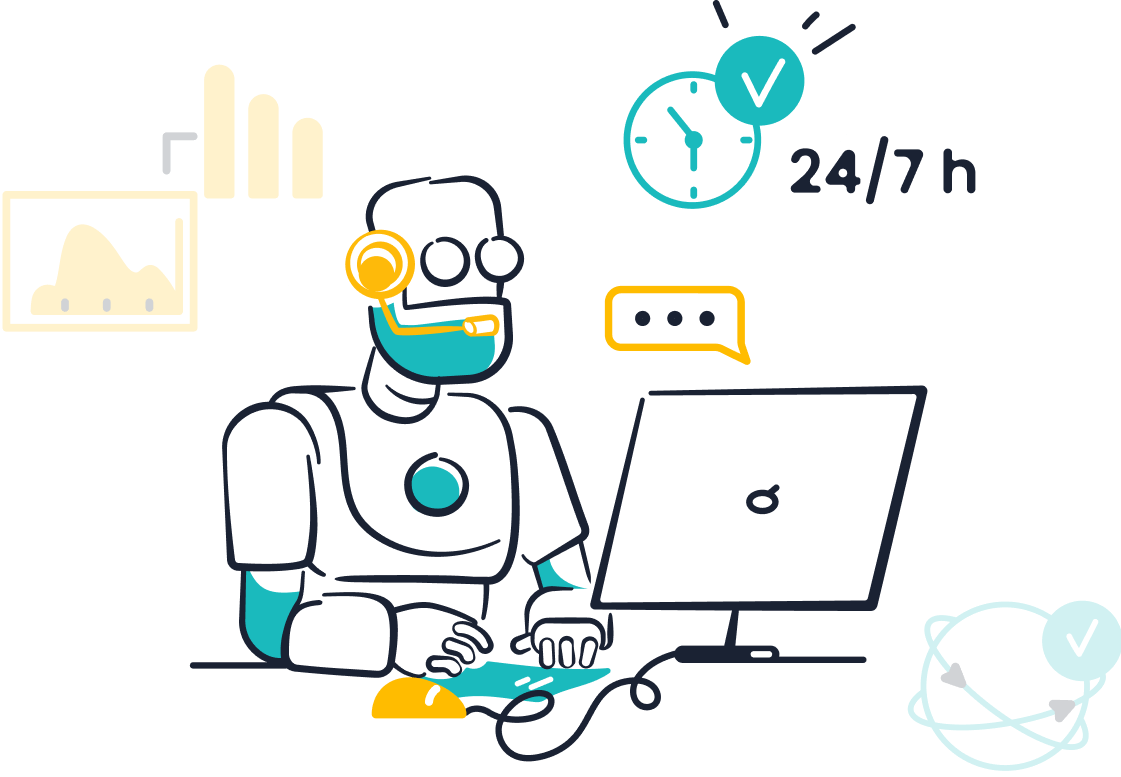
Top automatic customer service platforms drive business growth by streamlining support, boosting agent efficiency, and delivering seamless omnichannel experiences. Companies like Sobot and Sobot AI lead by combining advanced automation, AI-driven workflows, and robust customer service software. Research shows that 88% of call centers use AI customer service platforms to enhance customer experience, and businesses see up to 15% revenue growth from improved service. Choosing the right digital customer service platform means evaluating features, omnichannel integration, AI, pricing, and value.
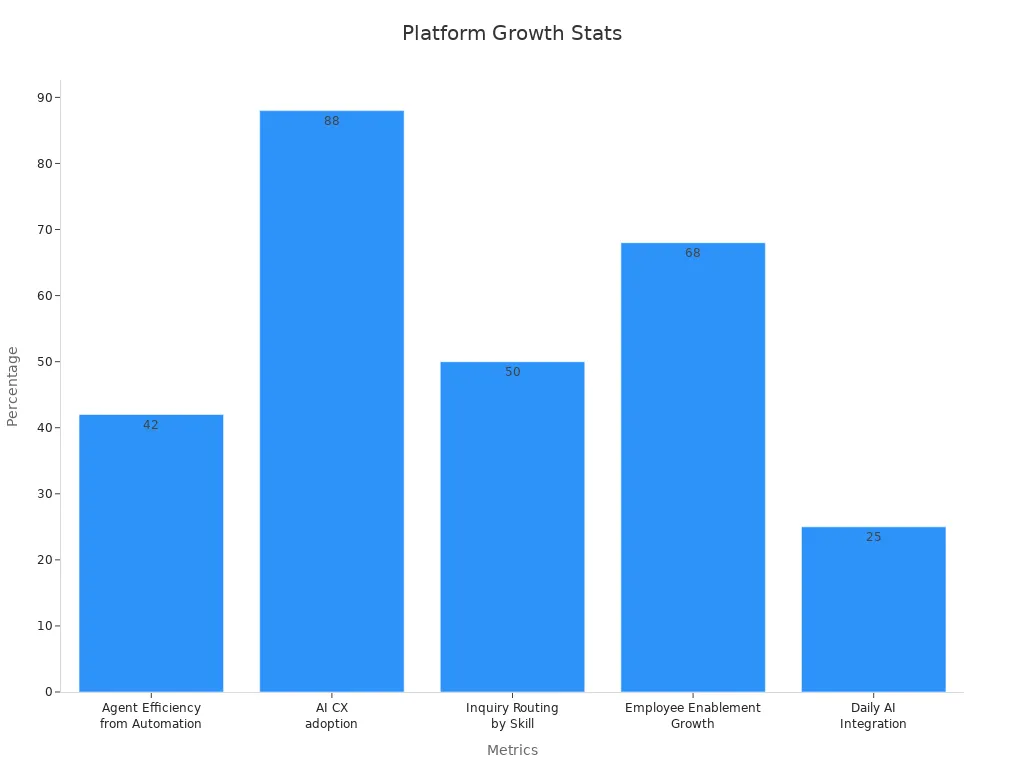
What Is an Automatic Customer Service Platform?
Automatic customer service platforms use advanced technology to automate and streamline support processes. These platforms combine AI, automation, and customer service software to manage interactions across multiple channels. Businesses rely on these solutions to deliver fast, consistent, and personalized support, which improves both customer experience and operational efficiency.
Key Features
Automatic customer service platforms offer a range of features that help businesses manage support at scale:
- AI-powered automation handles routine and complex tasks, such as ticketing, response generation, and case routing.
- Centralized customer service software consolidates messages from social media, ecommerce stores, WhatsApp, and SMS into a single dashboard.
- Automation tools provide instant, personalized replies, freeing agents to focus on complex issues.
- Multichannel support ensures customers can reach businesses through their preferred communication methods.
- Ticket categorization and prioritization systems help teams address urgent issues quickly.
- Integration with marketing tools allows seamless ticket creation from customer replies.
- Multimedia messaging supports images and videos, enhancing support quality.
- Proactive messaging keeps customers informed about product launches or service updates.
- Feedback collection tools, such as SMS surveys, help improve customer satisfaction.
Sobot’s all-in-one customer service software includes these features, offering AI-driven chatbots, omnichannel support, and easy integration with business tools. Learn more about Sobot’s capabilities at Sobot Omnichannel Solution.
Business Benefits
Automatic customer service platforms deliver measurable improvements for businesses. The following table highlights key benefits and their impact:
| Metric / Benefit | Quantitative Result / Impact |
|---|---|
| Average Handle Time Reduction | 56% decrease (from 6.5 to 2.9 minutes per interaction) |
| First Response Time Reduction | 74% decrease |
| Operational Cost Reduction | Up to 95% lower per minute compared to human agents |
| Customer Satisfaction (CSAT) Increase | Up to 24% increase (from 78% to 97%) |
| Net Promoter Score (NPS) Improvement | 174% increase (from 23 to 63) |
| Annual Cost Savings | $118,000 to $500,000 depending on organization size |
| ROI Range | 150% to 300% within 24 months |
| Ticket Deflection Rate | Up to 43% |
| Customer Engagement Increase | 40% |
| Agent Efficiency Improvement | 33% |
| Agent Time Freed | Up to 30% of agent time saved through automation |
| Scalability | Handles higher volumes without proportional cost increase |
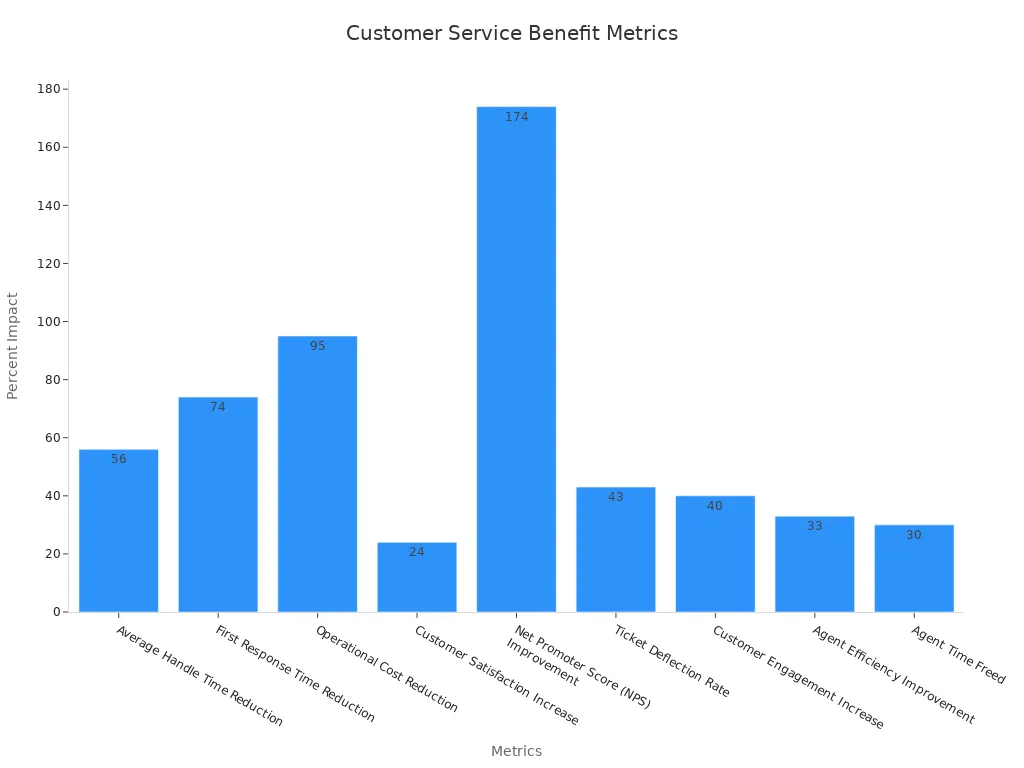
Companies using advanced customer service software, like Sobot, see faster response times, higher customer satisfaction, and significant cost savings. These platforms enable businesses to scale support operations and deliver a superior customer experience.
Leading AI Customer Service Platforms
The market for ai customer service platforms continues to expand rapidly, driven by businesses seeking to improve efficiency and customer satisfaction. The following table highlights the impressive growth and adoption rates in this sector:
| Metric | Statistic | Source |
|---|---|---|
| CAGR of AI in customer service (2016-2024) | 34.9% | MarketsandMarkets |
| AI handling customer interactions by 2025 | 95% | AI Business |
| Customer service orgs adopting generative AI by 2025 | 80% | Gartner/IBM |
| Organizations using AI in business functions (early 2025) | 78% | McKinsey |
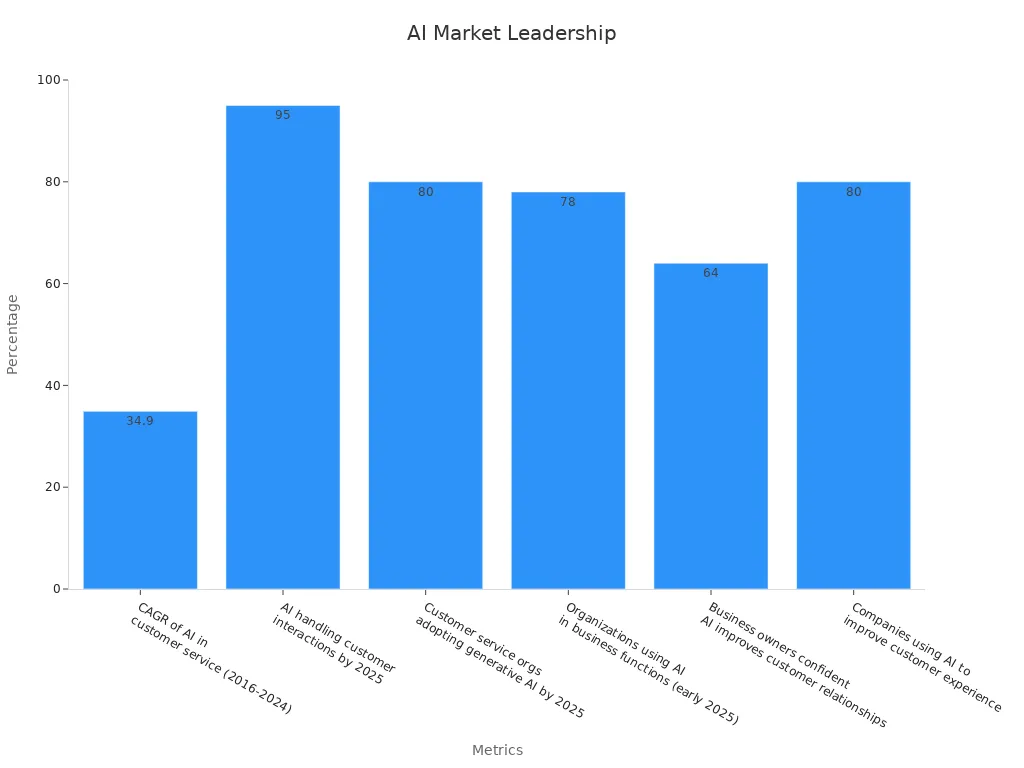
Sobot Overview
Sobot stands out among ai customer service platforms with its all-in-one customer service software. The platform delivers omnichannel support, integrating voice, live chat, ticketing, and WhatsApp API. Sobot’s AI Chatbot operates 24/7, handling regular queries and assisting agents, which boosts productivity by up to 70%. The chatbot is multilingual, customizable, and requires no coding, making it accessible for businesses of all sizes. Sobot’s ai-powered helpdesk software helps companies like OPPO achieve high resolution rates and customer satisfaction. The platform’s unified workspace and analytics drive efficiency and support business growth across industries.
Zendesk
Zendesk remains a leading name in customer service software, serving over 160,000 customers worldwide. The platform’s ai-powered helpdesk software supports more than 109 languages and offers advanced automation for ticketing and workforce management. Zendesk’s revenue reached $318 million in Q2 2021, with strong growth in the U.S., EMEA, and APAC regions. The company’s focus on AI chatbots and predictive analytics helps businesses personalize support and improve customer loyalty. Zendesk’s broad adoption highlights its role as a trusted ai customer support software provider.
Freshdesk
Freshdesk offers a robust platform for managing customer interactions across email, phone, chat, and social media. The platform’s ai chatbots provide 24/7 support, reducing agent workload and improving response times. Freshdesk’s customer service software includes advanced ticketing, SLA management, and gamification features to motivate agents. The platform’s customizable dashboards and community forums foster engagement and transparency, making it a popular choice for businesses seeking flexible ai customer service platforms.
Zoho Desk
Zoho Desk excels in delivering a comprehensive multi-channel ticketing system with strong automation and integration capabilities. The platform fits small to medium-sized enterprises, offering affordability and a free tier. Zoho Desk’s ai customer service platforms provide contextual insights, robust reporting, and seamless integration within the Zoho ecosystem. The platform’s ease of use and versatility make it suitable for industries like technology, retail, and healthcare, helping teams improve productivity and customer satisfaction.
HappyFox
HappyFox distinguishes itself with an AI Copilot that summarizes tickets, drafts responses, and provides chat support. The platform’s ai chatbots and omnichannel support enable fast, personalized service across SMS, social media, phone, and live chat. HappyFox’s customer service software includes real-time CSAT surveys, rule-based ticket assignment, and agent scripting. These features help teams resolve issues quickly, track satisfaction, and optimize workflows, making HappyFox a reliable choice for businesses seeking effective ai support.
Omnichannel Capabilities Comparison

Unified Customer Interactions
Modern businesses need to deliver seamless customer experiences across every touchpoint. Omnichannel platforms make this possible by connecting all communication channels—such as chat, email, phone, and social media—into a single, unified omnichannel view. This approach allows agents to see the full history of each customer, respond faster, and personalize every interaction.
Studies from McKinsey and Deloitte Digital show that 75% of consumers want seamless omnichannel experiences, but only 25% feel satisfied with what companies offer today. Companies that invest in omnichannel support see a 5-15% increase in revenue and a 54% boost in Net Promoter Score. Metrics like Customer Satisfaction (CSAT), First Contact Resolution, and Average Handle Time improve when businesses unify their customer interactions. For example, an Australian media company reduced call transfers by 69% and increased NPS by 149% after adopting an omnichannel strategy.
Tip: Companies with strong omnichannel support are 3.6 times more likely to increase customer purchases and loyalty.
Sobot Omnichannel Solution
Sobot’s omnichannel solution stands out by connecting all customer communication channels into one platform. Businesses can manage WhatsApp, live chat, email, and phone calls from a single dashboard. Sobot’s AI-powered engagement, enhanced by ChatGPT, automates routine queries and supports agents in real time. This unified approach increases efficiency by 100% and reduces operational costs by up to 50%.
Sobot’s omnichannel support includes multi-language capabilities, making it easy for global brands to deliver consistent customer experience. Companies like OPPO achieved an 83% chatbot resolution rate and a 94% positive feedback rate after implementing Sobot’s solution. Integration with CRM and ERP systems ensures that all customer data is accessible, supporting a seamless workflow.
| Feature | Sobot Omnichannel Solution |
|---|---|
| Channel Integration | WhatsApp, live chat, email, phone |
| AI Automation | Yes (ChatGPT-powered) |
| Multi-language Support | Yes |
| Real-time Agent Assistance | Yes |
| CRM/ERP Integration | Yes |
| Efficiency Improvement | 100% |
| Cost Reduction | Up to 50% |
Sobot’s omnichannel support helps businesses boost agent productivity by 70% and increase repurchase rates by 57%. This comprehensive solution empowers companies to deliver a superior customer experience at every stage.
Real-Time Automation and AI Features

Chatbot Technology
Chatbots have transformed customer service by delivering real-time assistance and instant support. Businesses use ai-driven automation to answer questions, resolve issues, and guide users through processes. Modern ai chatbots handle routine tasks, freeing agents for complex cases. These automated customer support tools improve efficiency and reduce costs. Metrics such as Customer Satisfaction Score (CSAT), Net Promoter Score (NPS), and Average Handling Time show the impact of chatbots on customer experience.
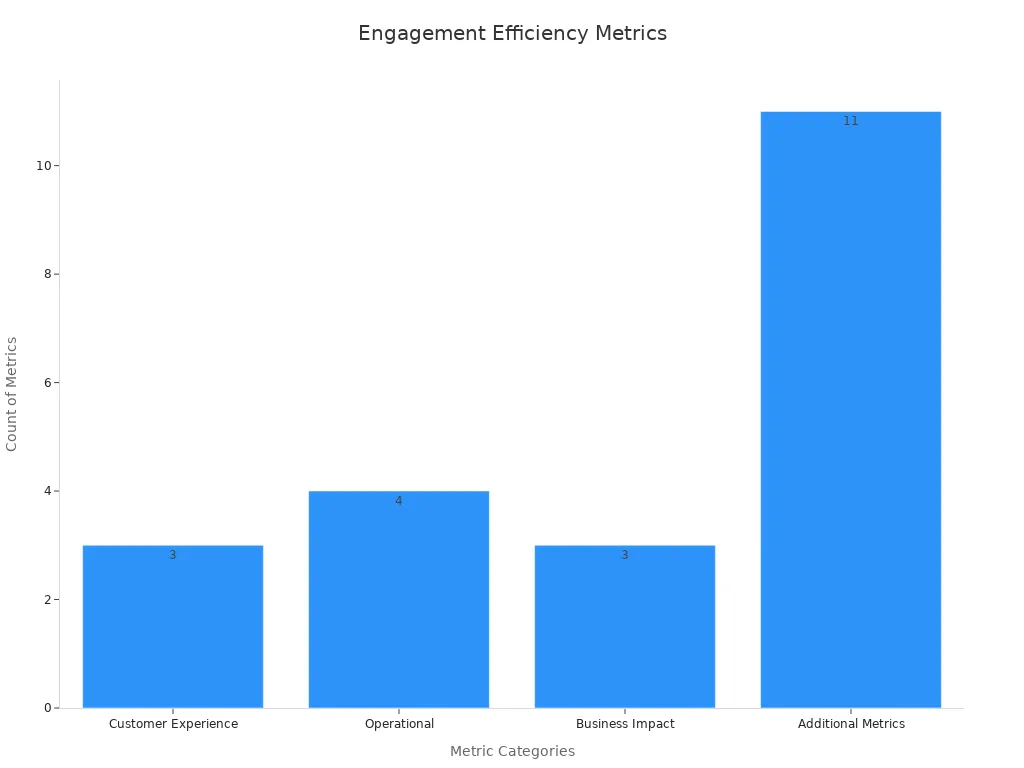

Companies track metrics like bot experience score, containment rate, and retention rate to measure chatbot performance. For example, average response time and bounce rate help identify areas for improvement. Sobot’s ai chatbot capabilities include multilingual support, 24/7 operation, and a no-code interface, making deployment easy for any business.
Automation Tools
Automation features play a key role in delivering real-time support. Businesses use ai-driven automation to manage high volumes of requests without delays. Automated customer support tools route tickets, send automated responses, and provide real-time data insights. A telecommunications provider reduced average resolution time from 8.5 minutes to 2.3 minutes using these tools. E-commerce companies process 15 times more orders during peak periods without extra staff, maintaining 99.8% accuracy.
- A financial services firm cut initial response time from 5 minutes to 30 seconds with chatbots.
- Automated monitoring tools track and improve response times, leading to higher customer satisfaction.
These examples show how automation features drive faster, more reliable service.
Sobot Real-Time AI
Sobot’s real-time AI delivers ai-driven automation across every channel. The platform resolves 70% of inquiries with AI, reducing agent workload by 60%. Businesses see conversion rates triple and NPS improve by 35%. Sobot’s chatbots provide real-time assistance, proactive messaging, and personalized experiences in multiple languages. OPPO achieved a 93% CSAT and a chatbot resolution rate of 83% after adopting Sobot’s solution. Real-time data insights help teams optimize workflows and deliver consistent, high-quality support.
| Metric / Client | Performance Indicator |
|---|---|
| Inquiry Resolution Rate | 70% of inquiries resolved by AI |
| Conversion Rate | Increased by 3x (tripled) |
| Agent Workload | Reduced by 60% |
| Conversion Rate (ROI) | Increased by 15% |
| Net Promoter Score (NPS) | Improved by 35% |
| Resolution Time | Under 1 minute |
| OPPO Customer Satisfaction (CSAT) | 93% CSAT achieved |
| J&T Express Sign-off Rate | Boosted by 35% |
| J&T Express COD Collection Rate | Increased by 40% |
Sobot’s ai customer support software empowers organizations to deliver fast, reliable, and scalable ai support.
Digital Customer Service Platform Comparison
Feature Table
Selecting the right digital customer service platform requires a clear view of each solution’s strengths. The following table compares leading platforms across essential features. This overview helps businesses match their needs with the right customer service software.
| Platform | Omnichannel Support | AI Chatbot | No-Code Automation | Multilingual | Integration | Analytics & Reporting | Best Use Case |
|---|---|---|---|---|---|---|---|
| Sobot | Yes | Yes | Yes | Yes | Salesforce, Shopify, WhatsApp, more | Advanced, real-time | Retail, finance, gaming, global brands |
| Platform B | Yes | Yes | Limited | Yes | CRM, Email, Social | Standard | SMBs, e-commerce |
| Platform C | Partial | Yes | No | Limited | Email, Chat | Basic | Small teams, startups |
| Platform D | Yes | Yes | Yes | Yes | CRM, Social, API | Advanced | Enterprises, regulated sectors |
Sobot stands out with its all-in-one digital customer service platform. It offers robust omnichannel support, a multilingual AI chatbot, and seamless integration with business tools. The platform’s no-code automation and advanced analytics make it ideal for companies seeking efficiency and growth.
Note: Businesses should assess their current and future needs before choosing a digital customer service platform. Omnichannel support and AI-driven automation often deliver the highest ROI.
Pricing Overview
Pricing models for digital customer service platforms vary by features, user count, and support levels. Most solutions offer tiered plans, allowing businesses to scale as they grow.
- Sobot provides flexible pricing based on usage, number of agents, and selected modules. Companies can start with core features and add advanced capabilities as needed. This approach ensures value for both small businesses and large enterprises.
- Platform B uses a per-agent monthly fee, with additional costs for AI and analytics.
- Platform C offers a basic free tier, but charges for integrations and reporting.
- Platform D targets large organizations with custom pricing and enterprise support.
Transparent pricing helps organizations plan budgets and avoid hidden costs. Sobot’s model supports scalability for growing businesses, making it a strong choice for brands expecting rapid expansion.
Tip: Always review contract terms and support options before committing to a digital customer service platform.
Scalability and Security
A digital customer service platform must deliver both scalability and security to support business growth and protect sensitive data. Sobot and other leading platforms invest heavily in these areas.
| Aspect | Details |
|---|---|
| Scalability | Platforms dynamically add capacity to handle millions of interactions across chat, voice, and video. |
| Architecture | Multi-zone, multi-region, triple-hot architecture on hardened AWS infrastructure ensures high availability. |
| Security | SOC2 Type II certification, GIAC GSEC certified security teams, end-to-end encryption, virus scanning. |
| Resilience | Customers experience no interruptions during major cloud outages due to robust fail-over capabilities. |
| Support | Dedicated 24/7 support infrastructure and years of experience in digital customer service deployments. |
Sobot’s digital customer service platform leverages a unified security posture. It integrates with existing security stacks, automates compliance management, and enforces real-time policies. The platform’s cloud-native design adapts to evolving threats and regulatory requirements, ensuring consistent protection across all channels.
- Scalable cybersecurity adapts using AI-driven analytics and automation.
- Efficient processing of large security data volumes reduces detection times.
- Automated compliance ensures adherence to GDPR and CCPA in multiple regions.
- Real-time adaptability and unified controls minimize operational risks.
Sobot’s commitment to security and scalability for growing businesses makes it a trusted partner for global brands. Its digital customer service platform supports millions of interactions daily, maintaining 99.99% system stability.
Businesses should prioritize platforms with proven resilience, strong certifications, and seamless integration with business tools.
Choosing the Right Platform
Business Needs Assessment
Selecting the right platform starts with a clear understanding of business goals and support requirements. Companies should evaluate how well a platform integrates with existing CRM and data systems. Decision-making tools like AI-powered simulations and scenario modeling help leaders predict outcomes and reduce risks. Key steps include:
- Assess integration with current data sources to avoid silos.
- Check for real-time analytics and automation to support agile decisions.
- Ensure scalability to handle growth in users and data.
- Review security features, including encryption and access controls.
- Compare total cost of ownership with expected ROI.
Tip: Use frameworks such as McKinsey’s CX model or Deloitte’s CX Operating Model to align platform features with customer experience goals and operational needs.
Industry Use Cases
Different industries require unique solutions to improve customer satisfaction and efficiency. For example, retail companies use platforms to manage large volumes of sales and support data, leading to better inventory management and customer targeting. In healthcare, unified reporting platforms enhance patient care by integrating data from multiple sources. Logistics providers benefit from real-time tracking and analytics, which improve delivery performance and customer satisfaction. These examples show how the right platform can drive measurable improvements across sectors.
| Industry | Use Case Example | Outcome |
|---|---|---|
| Retail | Sales and inventory management | Improved efficiency, satisfaction |
| Healthcare | Unified patient data reporting | Enhanced care, satisfaction |
| Logistics | Real-time delivery tracking | Faster resolution times, satisfaction |
Sobot Customer Success Story
OPPO, a global smart device leader, partnered with Sobot to transform its customer service. During peak shopping periods, OPPO faced high inquiry volumes and long wait times. Sobot’s platform integrated chatbots and ticketing, automating routine queries and freeing agents for complex issues. OPPO achieved an 83% chatbot resolution rate and a 94% positive feedback rate. The company also saw a 57% increase in repurchase rate, demonstrating how Sobot’s platform improved customer satisfaction and operational efficiency. Sobot’s unified solution helped OPPO deliver a seamless customer experience and achieve faster resolution times.
Choosing the right automatic customer service platform depends on business needs, industry, and support goals. Sobot’s all-in-one solution stands out for its AI-driven automation, omnichannel support, and proven impact on customer satisfaction. Key findings show:
- 85% of Americans recommend companies with excellent service.
- 84% of professionals say AI tools improve response efficiency.
- 66% agree AI helps personalize experiences, boosting customer satisfaction.
Companies should assess integration, scalability, and automation features. Exploring a demo with Sobot can help organizations achieve higher customer satisfaction and operational efficiency.
FAQ
What is an automatic customer service platform?
An automatic customer service platform uses AI and automation to handle customer inquiries across channels. These platforms, like Sobot, streamline support, reduce response times, and improve satisfaction. According to Gartner, 80% of organizations will use messaging and automation by 2025.
How does Sobot’s AI Chatbot improve efficiency?
Sobot’s AI Chatbot resolves up to 70% of regular queries automatically. It operates 24/7, supports multiple languages, and requires no coding. Businesses using Sobot report a 50% reduction in agent workload and a 20% increase in conversion rates.
Why do businesses choose an automatic customer service platform?
Companies select an automatic customer service platform to boost productivity, cut costs, and deliver faster support. For example, Sobot’s omnichannel solution helps brands like OPPO achieve an 83% chatbot resolution rate and a 94% positive feedback rate.
Can an automatic customer service platform integrate with existing business tools?
Yes. Leading platforms like Sobot offer seamless integration with CRM, ERP, and e-commerce systems. This integration ensures unified customer data and smooth workflows, supporting business growth and operational efficiency.
What industries benefit most from automatic customer service platforms?
Industries such as retail, finance, gaming, and enterprise services see significant gains. Sobot’s automatic customer service platform supports brands like Samsung, OPPO, and J&T Express, helping them manage millions of interactions daily and maintain high customer satisfaction.
Tip: Businesses that adopt an automatic customer service platform often see a 30% improvement in agent productivity and a 40% increase in customer engagement.
See Also
How AI Agents Are Transforming Customer Support Services
Ways AI Software Enhances Customer Service Efficiency Today
Comparing The Leading Interactive Voice Response Solutions
